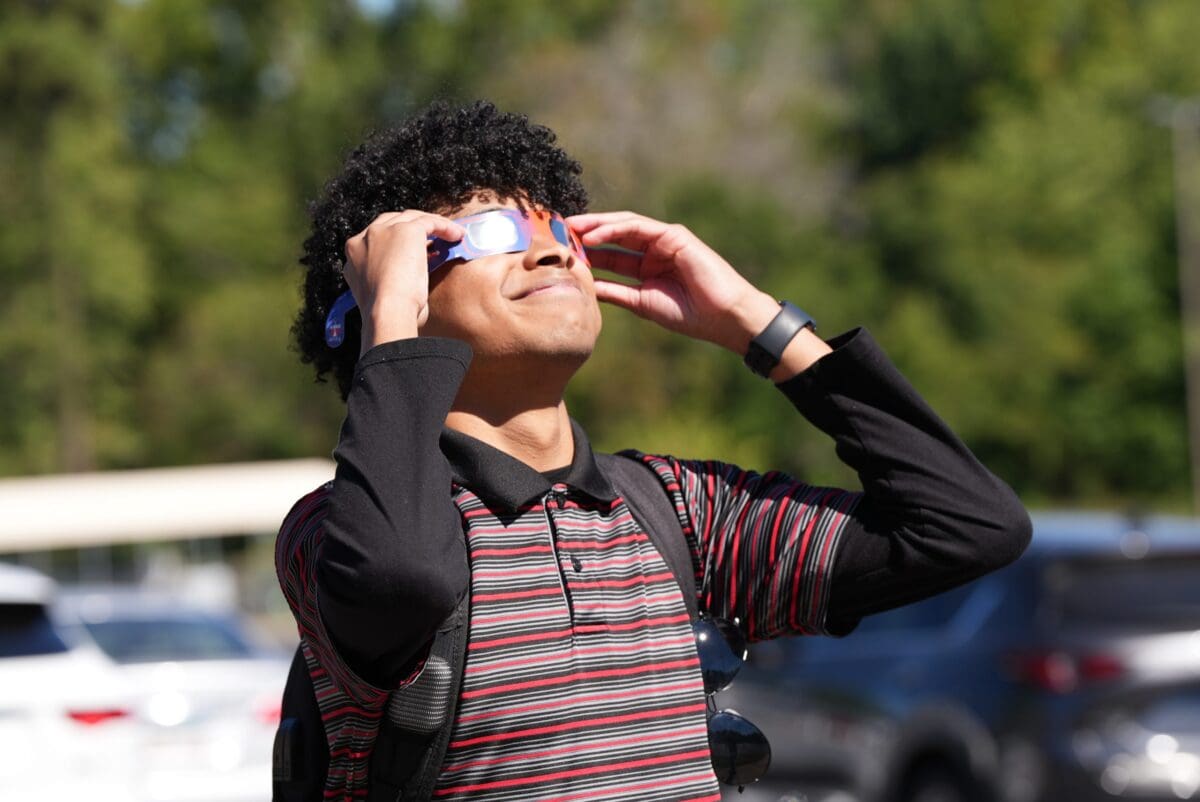Join UA Little Rock for a Spectacular Solar Eclipse Celebration on April 8

UA Little Rock invites students, employees, alumni, and the community to a solar eclipse celebration to witness the April 8 total solar eclipse together.
UA Little Rock welcomes the public community to campus to experience this rare event. The event will take place from 10 a.m. – 4 p.m. Monday, April 8, with activities both inside and outside of the Jack Stephens Center.
“If we don’t observe the Total Solar Eclipse on April 8, we won’t have another chance in Arkansas for the next 21 years,” said Dr. Gregory Guisbiers, associate professor of physics and astronomy at UA Little Rock. “That is why I encourage everyone to see the eclipse in April. For many of us, it’s a once-in-a-lifetime event.”
Little Rock lies within the eclipse path of totality, and is expected to experience two minutes and 29 seconds of totality from 1:51-1:54 p.m., with the partial eclipse taking place from 12:33-3:11 p.m.
The UA Little Rock School of Physical Sciences will hold guided observation sessions with solar telescopes from Celestron, transmitting the eclipse in great detail on large screens for everyone to enjoy. Additionally, there will be 50 telescopes with Solar Safe technology for children to observe the eclipse safely, and UA Little Rock will be handing out 30,000 pairs of complementary eclipse glasses provided by the Arkansas Space Grant Consortium.
Alaina Levine, author of “Networking for Nerds,” will be giving a guest lecture, “Don’t Eclipse your Future in STEM: Create Your Unicorn Career!” at 10 a.m. in the Jack Stephens Center. For over 20 years, Levine has been helping emerging and established leaders build meaningful careers. Following the lecture, there will be a book signing, and Levine will meet with UA Little Rock students, faculty, and staff to give them advice on how to boost their careers.
UA Little Rock will also have an inflatable planetarium, a Foucault’s pendulum, Cavendish’s balance, gravity well, meteorites on display, and children’s activities, such as manufacturing pinhole viewing boxes, face painting, and bounce houses, available to help all family members enjoy their day at UA Little Rock. Water stations and food vendors including Black China, Eat My Catfish, Léa-Léa’s Gourmet Dogs, Potbelly, Sodexo, and Ques All Smoked will be available.
Throughout the day, different UA Little Rock departments and centers will provide unique insights on the event through their presentations and activities. Some of these include a solar eclipse photo booth, eclipse history, Renaissance poetry, how to mathematically predict a solar eclipse, and the sun in Norse mythology.
“The eclipse event at UA Little Rock is a prime example of how different academic fields can come together to explore and learn,” Provost Ann Bain said. “We’re grateful to everyone participating in this event, as their unique academic perspectives enrich the learning experience for all. We’re excited to offer this unique learning opportunity for our students and the wider community.”
UA Little Rock will have two LightSound devices that will enable individuals with visual impairments to experience the solar eclipse through sound. The devices are provided by the LightSound Project at Harvard University, who are distributing these devices for use at universities, schools, and nonprofits across the country during the solar eclipse on April 8.
Power Technology, as experts in lasers and the science of light for more than 55 years, will provide laser demonstrations, using the instruments they normally use to measure lasers to display real-time changes in both the brightness and spectrum of the sun during the solar eclipse.
The solar eclipse celebration is funded by the Donaghey Foundation, Arkansas Space Grant Consortium, and the UA Little Rock Donaghey College of Science, Technology, Engineering, and Math.
For more information on the solar eclipse event, visit ualr.edu/eclipse.
